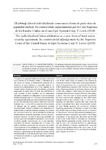El arbitraje laboral individualizado como nueva forma de pacto duro de seguridad sindical. Su controvertido enjuiciamiento por la Corte Suprema de los Estados Unidos en el caso Epic Systems Corp. V. Lewis (2018)

Use este enlace para citar
http://hdl.handle.net/2183/38228
A non ser que se indique outra cousa, a licenza do ítem descríbese como Atribución-NoComercial-SinDerivadas 3.0 España
Coleccións
- Investigación (FDER) [677]
Metadatos
Mostrar o rexistro completo do ítemTítulo
El arbitraje laboral individualizado como nueva forma de pacto duro de seguridad sindical. Su controvertido enjuiciamiento por la Corte Suprema de los Estados Unidos en el caso Epic Systems Corp. V. Lewis (2018)Título(s) alternativo(s)
The individualized labor arbitration as a new form of hard union security agreement. Its controversial adjudgement by the Supreme Court of the United States in Epic Systems Corp V. Lewis (2018)Data
2023Cita bibliográfica
ARUFE VARELA, A. y MARTÍNEZ GIRÓN, J. «El arbitraje laboral individualizado como nueva forma de pacto duro de seguridad sindical. Su controvertido enjuiciamiento por la Corte Suprema de los Estados Unidos en el caso Epic Systems Corp. V. Lewis (2018)». Revista Crítica de Relaciones de Trabajo, Laborum. nº 7 (2023): 177-190
Resumo
[Resumen]: Los pactos de seguridad sindical son un tópico tradicional en el Derecho de los Estados Unidos. A diferencia de lo que sucede en Europa, es relativamente frecuente allí la existencia de pactos blandos se seguridad sindical. Lo registra así la jurisprudencia de la Corte Suprema de los Estados Unidos. Resulta novedoso, sin embargo, el reciente surgimiento de pactos duros de dicho tipo, asimilables al viejo «contrato de perro amarillo», que los empresarios obligaban a estipular a los trabajadores en las dos primeras décadas del pasado siglo XX. Este nuevo tipo de pacto duro de seguridad sindical ha sido controvertidamente enjuiciado por la Corte Suprema de los Estados Unidos en el caso Epic Systems Corp. v. Lewis (2018), a propósito de los contratos de arbitraje que las grandes corporaciones privadas norteamericanas obligan a estipular a sus trabajadores no sindicalizados (o más precisamente hablando, no cubiertos por convenios colectivos), con la finalidad de excluir que puedan plantear demandas ejercitando acciones plurales o acciones colectivas. Se trata de pactos que pretenden dar un trato igual a los trabajadores asalariados y a los clientes de dichas grandes corporaciones. En el caso analizado, convencen las razones esgrimidas por la icónica Juez Ruth B. Ginsburg, sosteniendo que los pactos en cuestión violan el derecho de los trabajadores a realizar actividades concertadas (que no es sólo un derecho dotado de contenido sustantivo), garantizado por la legislación federal sindical norteamericana (y en el caso de autos, por la Ley Nacional de Relaciones Laborales o, según su nombre popular, Ley Wagner de 1935) [Abstract]: Union security agreements are a traditional topic in the Law of the United States. In contrast to the situation in Europe the existence of light union security agreements is relatively frequent there. It is so registered by the case law of the United States Supreme Court. However, the recent rising of hard agreements of such kind, similar to the old «yellow dog contract» which employers forced workers to stipulate in the first two decades of the last 20th century, is novel. This new kind of union security agreements has been controversially adjudged by the United States Supreme Court in Epic Systems Corp. v. Lewis (2018), regarding the arbitration contracts that large American private corporations force their nonunionized workers (or more frankly speaking, not covered by collective bargaining agreements) to stipulate, in order to bar that they can file suits exercising joinder actions or collective or class actions. These are agreements pretending to give an equal treatment to customers and workers of such large corporations. In the instant case, the reason put forward by the iconic Justice Ruth B. Ginsburg are convincing, holding that the agreements at issue violate the workers’ right to carry out concerted activities (a right having not only substantive contents), guaranteed by American federal union legislation (and in the case at issue, by the National Labor Relations Act or, according to its popular name, Wagner Act of 1935).
Palabras chave
Acciones plurales y colectivas
Arbitraje laboral individualizado
Corte Suprema de los Estados Unidos
Juez Ginsburg
Pactos duros de seguridad sindical
Joinder and class actions
Individualized labor arbitration
Supreme Court of the United Stated
Justice Ginsburg
Hard union security agreements
Arbitraje laboral individualizado
Corte Suprema de los Estados Unidos
Juez Ginsburg
Pactos duros de seguridad sindical
Joinder and class actions
Individualized labor arbitration
Supreme Court of the United Stated
Justice Ginsburg
Hard union security agreements
Versión do editor
Dereitos
Atribución-NoComercial-SinDerivadas 3.0 España
ISSN
2792-7970






